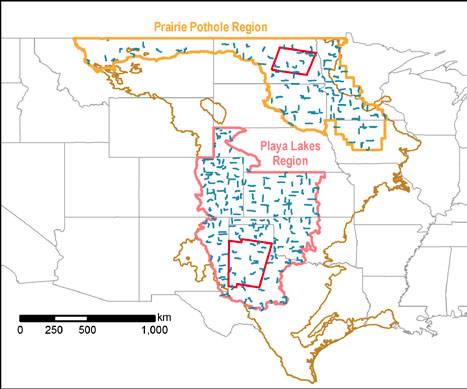Climatic and Anthropogenic Forcing of Wetland Landscape Connectivity in the Great Plains
Investigators:
Bram Verheijen, Post-Doctoral Research Associate
Collaborators:
Dr. David Haukos, Kansas State University
Dr. Christopher K. Wright, South Dakota State University
Dr. Geoffrey M. Henebry, South Dakota State University
Dr. Carter Johnson, South Dakota State University
Dr. Carol A. Johnson, South Dakota State University
Dr. Michael C. Wimberly, South Dakota State University
Dr. Katharine Hayhoe, Texas Tech University
Dr. Nancy E. McIntyre, Texas Tech University
Dr. Frank W. Schwartz, Ohio State University
Dr. Ganming Liu, Ohio State University
Dr. Glenn L Guntenspergen, University of Minnesota-Duluth
Funding:
National Science Foundation
Location:
Kansas, Oklahoma, Texas, Nebraska,
Colorado, New Mexico, North Dakota,
South Dakota, Minnesota, Iowa, and
Montana
Completion: May 2018
Status: Completed
Objectives:
Use the PCHM-S model to simulate water body presence/absence across the entire Prairie Pothole Region (Fig. 1) on monthly time steps, both historically and under projected climate change. Projected wetland landscapes under climate change will be simulated using downscaled GCM data.
Address the development and application of an enhanced, spatially explicit version of the PCHM model, named PCHM-II. PCHM-II will incorporate key hydrologic processes including evaporation/evapotranspiration, runoff, infiltration, and groundwater flow to provide a monthly accounting of inflows to and outflows from each water body. It will include significant upgrades and extensions from PCHM-S.
Progress and Results:
Macrosystems biology examines how local patterns are influenced by components at regional to continental scales through interactive, contingent feedbacks across different spatial and temporal scales. Interactions across scales occur via such processes as hydrological flows, biogeochemical exchanges, or movements of organisms. Thus, understanding connectivity's how, when, and where landscapes can enhance or impede movement, and how those dynamics can be affected by human activities is integral to Macrosystems Biology. Habitat connectivity is a landscape attribute critical to preserving biodiversity in the face of climate and land use change. The proposed research builds on a successful Category I proposal which used wetland landscapes in the U.S. Great Plains as model systems for studying the influence of climatic drivers on landscape habitat connectivity. This proposal builds on our Category I study by incorporating land cover/land use change (LCLUC) and more sophisticated hydrologic modeling into an assessment of the drivers of wetland landscape habitat connectivity in the Great Plains; including projection of climate change and LCLUC impacts on amphibians and waterbirds under a range of likely future scenarios.
Prairie wetlands have been identified as highly sensitive and vulnerable systems to climate and landscape change. The project addresses the challenge of transformational science by using new data acquisition, simulation models, and analytical techniques that enables "fourth paradigm" science to examine human-ecological dimensions at macroscales. Great Plains wetlands form a migratory network linking regional to continental scales of habitat selection. Both birds and amphibians serve as sentinels of environmental change. The transformational aspect of this project is its leveraging of an existing biological dataset, the Breeding Bird Survey, such that information will be extracted from the BBS using cutting-edge hydrologic modeling and GCM downscaling in a way that has been impossible, or not envisioned, to date. Climate change threats to biodiversity cannot be adequately projected by extrapolating historical climate envelopes for groups of species to projected climatic niche-spaces under global change. This project is transformative in that it offers a way forward. By examining interactions between climate projections, land cover projections, and habitat connectivity in Great Plains wetland landscapes, the modeling can identify the actual habitats implicit in climate envelope projections, locate where those habitats will be under climate and land cover change, and assess theability of affected species, specifically waterbirds and amphibians to move to those future habitat patches via habitat connectivity.
More than half of North American ducks breed in the PPR and the region supports the continent's largest and most diverse populations of breeding shorebirds. Geospatial data products and simulations models generated by this study make a practical contribution to the management of water resources and wildlife and provide new capabilities for regional-scale conservation planning and decision-making in the Great Plains. Societal benefits arise from using existing relationships with the Prairie Pothole and Playa Lakes Joint Ventures, which are partnerships among landowners, scientists, and state- and federal government agencies with a goal towards long-term wetland restoration and management, to disseminate finding to these communities. Training of the next generation of scientists comes from vigorous engagement of undergraduate and graduate students and postdoctoral research associates in this multi-institutional, cross-disciplinary project.
Products:
Book Chapter:
Albanese, G., and D. Haukos. 2017. Toward a theory of connectivity among depressional wetlands of the Great Plains: resiliency to natural and anthropogenic disturbance within a wetland network. In Press in E. Beever, S. Prange, and J. Franklin (editors). Disturbance Ecology and Biological Diversity: Context, Nature, and Scale. CRC Press/Taylor and Francis Group.
Publications:
Albanese, G., and D.A. Haukos. 2017. A network model framework for prioritizing wetland conservation in the Great Plains. Landscape Ecology 32:115-130.
Presentations:
Albanese, G., and D. Haukos. 2015. A framework for understanding connections within dense broad-scale habitat networks: prioritizing wetlands for conservation within a dynamic landscape. Annual meeting of the Society of Wetland Scientists, Providence, RI. (Invited speaker)